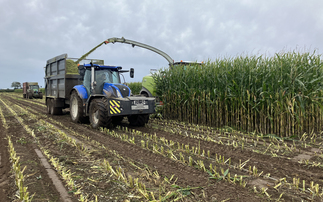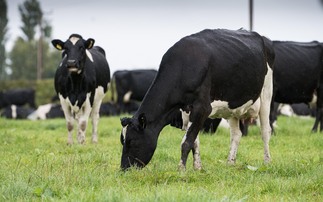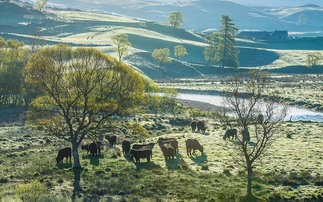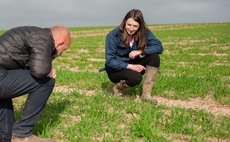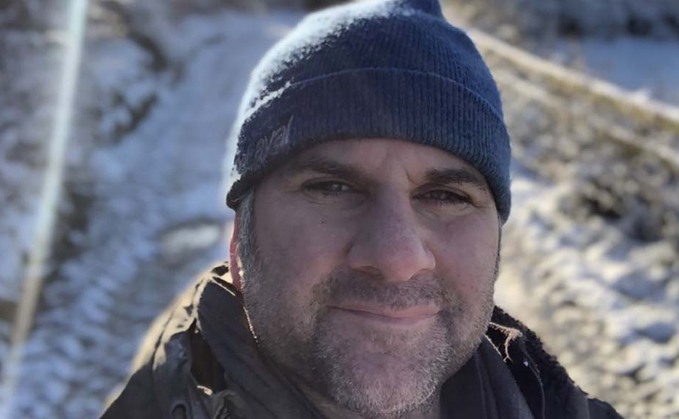
I could tell Kirsty was going to say something I did not want to hear, she was spending a long time with the callipers on the bottom lump, reading the measurement and moving back up to the top for a comparison.
Finally she said: "She is going to be an IR I am afraid James."
That was the first time I had ever heard a vet utter those words and nothing had prepared me for it. It hit incredibly hard, I asked her to check it again, just to be absolutely sure. It was the same reading.
Before we went in for breakfast we had another four IRs, so five inconclusive results from that group of 90 milk cows.
Listen to the podcast below - 'Farmers see no end in sight for bovine TB'
Questions
Over toast and cereal, we asked the questions which came to mind first; do we have to isolate those five? When will we be retesting? Are we under an instant movement restriction?
See also: More blogs from In Your Field writer James Robinson
These sorts of questions probably seem so simple and obvious to farmers in areas of the country where bTB has been a major battle for years, but up here we felt like we would escape becoming members of the club that no one wants to join, but no, unfortunately we were now under bTB restrictions.
The group of 40 dry cows and in-calf heifers were already waiting in the locking feed yokes when we came out from breakfast, we had pushed up their silage so that they came forward from their cubicles and could fill their bellies while they waited.
We flew though the first three bays; 21 animals where the callipers only came out twice and they were just reacting on the avian at the top. Then Kirsty went quiet, and I could see she was remeasuring both lumps on Barrington Dot 25.
"I'm sorry James, this is a reactor."
She checked the laminated score card for confirmation, but I already knew, so did Kirsty. I wrote the measurements down on the recording sheet, I also added her tag number to the growing list on the top, but this time in a separate column with a big R in bold.
See also: VIDEO: Derbyshire targets being bovine TB free in a decade
Out came the green DNA tag which was loaded into the pliers and then punched into Barrington's right ear. That was it, her fate was sealed.
I messaged Michelle, my wife. Flipping heck, was her reply.
It got worse, in a group of new calved and older cows we had another reactor and two more inconclusive.
Resignation
My reaction was just one of resignation. Resignation to the fact that bTB had reached us and had got hold of not just one cow, but two as confirmed reactors and a further eight inconclusive.
In total, almost 10 per cent of our adult animals had shown a reaction. And yet, only 12 months previously we had passed with flying colours, with Kirsty only needing to measure a small handful of cows.
I rang our neighbouring farms, I needed to tell them myself before the inevitable gossip began circulating around our parish.
It took me almost 24 hours before I spoke to the final farm, and by then the news had already reached them.
Support
The support I got from our near neighbours was incredibly humbling, I was not tutted at or chastised, or asked how we had got it. Instead I was asked how I was and how the rest of the family were too. It was similar to phoning them up to say a family member had died. Those thoughtful replies helped with the initial shock a great deal.
We do not know how we have got to this, from never even having an inconclusive in almost 90 years of TB testing at Strickley, to 10 animals in one test.
We do not buy stock in, in fact the last animal we bought in was a bull 10 years ago and he was completely isolated and retested before moving up to the main buildings.
We do not attend many shows and have only been to our local county show over the past five years.
See also: Bovine TB policies are 'not working for farmers'
We have double fences around our farm border to give us a buffer next to our neighbours, which protects our stock and theirs.
But our area is clean in the eyes of APHA, and we have been in a four-year testing regime until last year, when a nearby farm had a minor breakdown which quickly fizzled out. In fact until we had the bad news, no one else (to my knowledge) has had any failures.
APHA have told us that, because we are not in a designated hotspot, the eight inconclusive animals will not be taken as dangerous contacts, so they are remaining on farm in isolation until the end of January, when we will retest the entire herd again.
This seems a bizarre decision. Why would they leave eight potentially infected animals on a farm when there has been an obvious change in their TB status over a very short timeframe?
We are isolating them across the yard and in separate airspace, but they still have to milked through the parlour after all the others have been through, mucking over the yard and eating from the same parlour troughs.
If we were in a designated ‘hotspot' the response would have been quite different, the eight IRs would have been taken and compensated for. But instead of trying to nip the outbreak in the bud, the APHA and its lacklustre policy seems to want to wait and see if it develops into a hotspot before responding.
The only reason that AHPA will not take them is for short-term financial reasons, and that does not help the wider TB eradication aim at all.
Rumours
There are no doubt rumours buzzing about, with false facts and pure gossip. The stigma attached to having a bTB breakdown in a supposed clean area is real, it comes from the belief that farms around here would always steer clear of the problems others face, it comes from a general ignorance of disease prevention at individual farm level too, and also with animal movements which are always deemed safe if they have had a clear premovement test.
The tests are obviously not good enough if the disease was not detected 12 months ago here, and we as farmers should also realise that and think very carefully about moving animals freely between farms both locally and from one area to another.
It is hard being the farmer when the news is delivered, but it is equally as hard for the vets delivering that news.
Mental strain
bTB testing is a physically draining job, the mental strain is even greater though. Those who have helped me so far have been incredible. Kirsty our Vet from Yan Farm Health has been superb from the moment she measured the first cow, Helen Forrester from the NFU and Sarah Tomlinson from TBAS have guided me through what will happen and how to deal with it.
Many farmer and vet friends, some of whom have been dealing with this pig of a disease for far too long, have been there with support and advice, it all helps.
Talking about it removes the stigma and will help those who may find themselves having that bad bTB test day.












